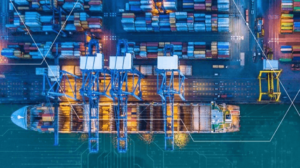Benefits of data
Data can aid maritime executives in tackling the biggest industry challenges. There is no escaping the issue of decarbonization and developing a plan for both vessels and entire fleets is now a commercial imperative; a strong sustainability strategy is underpinned by a clear data strategy.

Data-led insights can also guide the c-suite through the myriad of complex incoming environmental regulations that are set to shake up how the sector operates. While laudable in terms of their environmental ambition, the IMO’s EEXI and CII requirements, for example, will heap pressure on owners, operators and charterers.
Every year from 2023 onwards, shipowners will have to calculate and report their fleet’s Annual Efficiency Ratio (AER) and resulting CII rating, which is ranked from A to E. Rating thresholds will tighten annually and a low performing ship will become a serious commercial risk. A strong CII rating is already becoming a ‘license to operate’ in the eyes of some cargo owners.
Given this context, real-time visibility of a vessel’s preliminary CII rating based on operational data, as well as insights and tools to allow operators to optimize for CII performance over a voyage or series of voyages will be invaluable. Using data, owners and operators can continuously monitor the CII performance of their vessel to avoid having to take drastic efficiency measures unexpectedly if their rating is lower than estimates.
Decarbonization is also set to redefine how the industry remains competitive. Emissions are becoming increasingly integrated into costs as carbon taxes such as the EU’s Emissions Trading System are introduced. Adopting technology that effectively leverages data onshore and onboard vessels will boost competitiveness, increase asset value and make your ships more attractive to a new generation of seafarers.
By offering insights on the factors impacting a vessel in real time, data can support better decision-making on ways to optimize operations. It can be used by shoreside staff evaluating fleet-wide decisions, as well as for crews making moment-to-moment decisions. Ultimately, when used effectively, data and technology can improve a vessels’ safety, operational efficiency, and emissions – in turn, helping to reduce overall costs.
Read Also: What Is A Flag Of Convenience?
Unlike manual processes, data remains responsive to change – and maritime operations are constantly evolving. Everything from regulatory compliance, to sanctions, to fluctuating fuel costs demands decision-making that can keep pace. So it’s clear that fast access to clear data-led insights will enable owners and operators to make optimum, timely decisions.
As well as aiding decision-making, data also underpins Environmental, Social, and Governance (ESG) reporting. Data transforms transparency and accountability to counterparties by uniting multiple sources of information for the most accurate representation of the facts. Data can be efficiently relayed using standardized reporting processes that makes a vessel’s considerable data input clear, streamlined and manageable.
There are clearly many benefits of using data and digital technology effectively, so what’s stalling the industry’s progress in this area?
Kindly like us on Facebook/twitter















